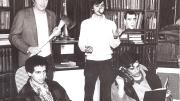The Simpsons and Their Mathematical Secrets, by the British scientist and journalist Simon Singh, illuminates some little-known facets of the popular, long-running TV show. It turns out that several of the writers for The Simpsons and its spinoff series, Futurama, are genuine math and science nerds who have been able to exercise their intellectual muscles while writing some of the funniest comedy on television. In an appearance sponsored by the Office for the Arts, Singh came to the Harvard campus on November 4 to give an evening talk on his book at the Science Center.
In his introductory “Chapter 0,” Singh cites the academic degrees of “five of the nerdiest writers,” a list that includes J. Stewart Burns ’92 (mathematics A.B., plus M.S. in math from Berkeley); David S. Cohen ’88 (physics A.B., plus M.S. in computer science from Berkeley); Al Jean ’81 (mathematics A.B.); Ken Keeler ’83, Ph.D. ’90 (both degrees in applied mathematics); and Jeff Westbrook ’83 (physics A.B., plus Ph.D. in computer science from Princeton). In addition, Michael Reiss ’81, who was one of the original Simpsons writers along with his friend and fellow Lampoon member Jean, had a flair for mathematical puzzles as a boy and made the Connecticut state math team, though he opted for an English concentration at Harvard.
Singh, who earned a doctorate in physics at Emmanuel College, Cambridge, was already a devoted Simpsons fan when, in 2004, he noticed a school blackboard in one scene on the show that depicted some familiar-looking equations. Specifically, in an episode written by Cohen, “The Wizard of Evergreen Terrace,” he noticed a “very clever, near-miss solution” to Fermat’s last theorem; this jumped out at Singh, one of whose books is Fermat’s Enigma. Furthermore, a mathematical formula at the top of the blackboard was a mathematical prediction of the Higgs boson—again, Singh, a particle physicist who had worked at CERN, instantly recognized its provenance. He began logging such occurrences on The Simpsons and Futurama. (Writers have often migrated back and forth between the two staffs.) “They are really sophisticated ideas,” he explains. “But generally they appear in the background, as ‘freeze-frame’ gags. They don't let these things get in the way of the comedy.”
The vast majority of viewers, of course, are oblivious to these mathematical and scientific allusions—or will be, at least, until they read Singh’s book. For most, the embedded references might be “surprising, even shocking,” he says, “but the math is real. Yes, you could talk about the sociology or philosophy of The Simpsons. But you could apply that kind of analysis to Dallas or any TV show—you can’t do a book on the mathematics of Modern Family.”
One story illustrates the depth of the scientific backdrop involved. Cohen had written a paper on “pancake numbers” for a journal while he was a graduate student at Berkeley; it took a couple of years to work its way into print, and by the time it was published, he had been writing for The Simpsons for some time. When the research article finally appeared, Cohen brought a stack of reprints to work. “Hey, I’ve got an article in Discrete Applied Mathematics,” he announced, in Singh’s telling. Everyone was quite impressed, except Ken Keeler, who said, “Oh, yeah, I had a paper in that journal a couple of months ago.”









